#boutdatrethinklife
Explore tagged Tumblr posts
Text
my school is closed for business

article by big sister love rush | rethink vanguard | 18 years old
The education system has been the main thing on many people’s minds over the past three weeks. While my friends and I are counting the days to prom and graduation, a lot of other people are waiting as the Orleans Parish School Board makes decisions about “what to do” with the last five public schools in New Orleans.
I'm a graduating senior at Algiers Technology Academy (Algiers Tech); it's has been my school home for the last four years. Early this year I learned that my class, the class of 2017, would be the last class at Algiers Tech. My school is closing in June of this year [2017]. Many students who attend my school, those who won't be graduating with me, are upset that they won't be graduating from Tech and won't be able to graduate at the top of their class. For me, being in the Top 5 of my class is a huge accomplishment and I know many students wanted to have that opportunity at Tech. Now they will have to compete for a spot at schools with hundreds of students, instead of a school like Tech whose student body was never more than five hundred. And, because of school rules around being four year students, won't be eligible for top honors at their new schools. I feel like this is unfair. So, for the last month, I have gotten more involved in education conversations in New Orleans.
On March 30th, 504ward—an organization designed to support young (25-35) “talented” middle class professionals in New Orleans—hosted, A Panel on Public Education in NOLA. At first I was confused why a group of mostly childless, mostly white folks were hosting a whole event on education and then I learned that Leslie Jacobs, “architect” of Louisiana’s school accountability reform and one of the creators of the Recovery School District was also one of the founders of 504ward. She was one of the main people to take control of schools and education out of the hands of parents, like my mother, who has and is raising five brilliant children and put education into the hands of outsiders and the Recovery School District (RSD).
The charter schooling[i] system doesn't allow my mother to come check on me at school because its "dangerous". Organizations that claim to be "for youth and parents" but support charters are taking control and taking choices from families. School choice is a myth. 504ward's panel on public education seemed to be designed for people who don’t know much about the state of education in New Orleans. And the event, not surprisingly, didn’t look nothing like the 10th ward community that it took place in and there were very few people who identified as parents of school age public school students.
When I, and about 40 other youth who are part of Rethink, showed up at this event and the adults seemed first surprised, then confused and then unhappy. I sat through four presentations where educators talked about what happens to youth in New Orleans and told some of "our stories" without addressing us or acknowledging that we had vital knowledge about public education in New Orleans. We [Rethinkers] know that we are the experts because we attend these schools on daily basis.
At the meeting, we made comments and questioned the theories of these adults when they talked about "what works in schools", and got nothing in return but backlash and the regular questions like "who are experts in this?" "who worked through pre and post Katrina?" They act like we have no expertise. We are the people who actually experience all of their experiments in schooling. We know that charter schools mean privatization and control over every aspect of youth's lives. Schools becoming charterized means that students, teachers, and parent voices are silenced. We left the meeting knowing that this wasn’t going to be an easy fight. But we didn't go home. Instead all of us students met together to debrief what we just experienced and came up with strategy for how we wanted to move forward.
This very serious and unfortunate issue of charter schools has caught people's attention countrywide. A week after the 504ward meeting, representatives from the national NAACP came to town to host a public hearing to collect evidence on the State of New Orleans schools as part of a nationwide project to investigate the impact of charter schools on youth and families. If I had a dollar for every person who comes to New Orleans to "collect evidence" and "study the effects of charters, or poverty, or inequality" I would be able to fund free college education for all students in New Orleans. Maybe we should keep that in mind as a strategy to replace TOPS.
The NAACP event was once again centered around lots of adults who ran CMOs, were principals, lawyers, etc. talking about the state of New Orleans Schools. Only about fourteen youth attended the event and ten of them were my fellow Rethinkers. We attended the Education Task Force Hearing to provide our thoughts, research, and analysis to the meeting. We were concerned because we remembered when the local NAACP voted in favor of charter schools and wanted to make sure that the National Task Force was clear that most Black New Orleanians want public schools and public control instead of the harsh discipline, extreme testing, and lack of accountability to families that our current charter schools operate with in this city.
The hearing was lit[ii] from the beginning and my friends, at one point, asked an adult to give them his public comment time to talk to the Task Force about how adults are failing youth in this city. We TOOK the time we were given and then some. We really wanted to share what happens in our schools; how the few permanent teachers we have work so hard for us, how so many classes are ran by short term substitutes, how food runs out at meal times, and how we worry if our school’s reputation is good enough to support us in getting into the college or careers we want. We shared how we face two hour commutes to and from school, are forced to experiment with digital learning with systems like Odyssey, are punished for having the wrong color sweater, or how we worry about being able to attend a school that will give us the education we need.
This meeting escalated quickly as audience members (New Orleans residents), were chastised for being too emotional with their truth. I couldn't believe that in this space, our behavior was being controlled. But that's the story of oppressed people, right? We're supposed to take all the oppression and then "behave" accordingly when we are telling the truth of our experience.
After being asked to sit down by an adult moderator, 1 of the 3 young students stood with dignity and stated, "You don’t attend the school, you're not there everyday. The Teach for America teachers don’t care about us, charter schools don’t care about us, and our futures are at stake."
As people came to remove students from the microphone, their elders and adult supports in New Orleans community, yelled " Don’t You Touch Them" and "Let Them Babies Speak."
One of the Rethinkers in the audience then began to lead everyone in the freedom song, "Ain't Gonna Let Nobody Turn Me Around."
Emotions broke through as these young people shared that they are afraid for their futures as their school, McDonogh 35, faces privatization and New Orleans becomes the first all charter school district in the country. We promised one another to get together again one week later to attend a meeting hosted OPSB on the future of 35 and New Orleans last 5 public schools.
This last meeting was perhaps the strangest of all. I think it was supposed to be a meeting about what to do with the last five public schools but instead became largely a pep rally for two competing CMOs; ExCEED and InspireNOLA. The School Board didn’t talk about how they might keep the last five schools public, how students and parents might have a larger say in education or about the failings of charters; they didn’t talk at all. Through all these meetings I keep thinking, who is profiting? Who wins when my school is closed? Who succeeds when conversations about education don’t include and aren't centered around students, families and teachers? Who benefits when groups are examining the damage of privatized schools on students without any plan on how to stop that damage? Who is aided when discussions become pep rallies? Who makes the money when schools become sites to make a profit?
This reminders me of a conversation started by Rethinkers way back in the Fall right before the school board elections. We held a youth centered school board candidate's forum for over 200 youth and some of their families.



At the forum we announced our petition to lower the local voting age to 14. One of the main reasons for our petition is the unfairness of a school board elected by people who aren't students. I know our school board would actually have to show up differently and represent youth interests if we were the ones that put them in their positions.

PLEASE SIGN OUR PETITION TO LOWER THE VOTING AGE IN NEW ORLEANS. WE ALREADY HAVE OVER 400 YOUTH SIGNATURES. WE NEED SOLIDARITY FROM ADULT SUPPORTS AS WELL.
ADULTS -- CLICK THIS LINK TO SIGN: RETHINK PETITION TO LOWER VOTING AGE
Youth lives, voices, and futures are not being valued. A stand for justice needs to be took and the time is now! Youth are the experts and we deserve to be treated like we are. I am one student. I am one of over 100 students at Rethink who want an education for all youth that includes analysis of the systems that run society and that teaches us our true history and the role that it plays in our current lives. We want curriculum that represent us and people like us. We want input from youth of color on curriculum and teacher trainings. We want educational infrastructure to support youth entrepreneurship, youth cooperatives and business opportunities that support the communities we come from. And we want real youth and community input and veto power on all decisions regarding school openings, closings, leadership, and locations.
We can and will do it. We will take our education in our own hands because we are the experts of our experience.
[i] Schooling is what happens in schools; it’s about control and discipline. Education is about sharing power and knowledge
[ii] Lit means fire, hot, interesting
2 notes
·
View notes
Text
get out: black educator edition (new orleans schools)
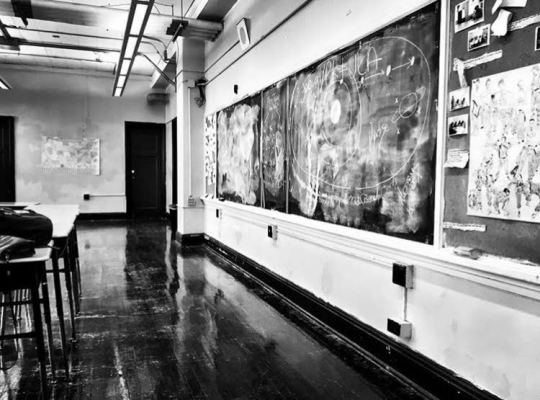
by a black educator in new orleans | pen name barbara jean wells
The 2015-2016 school year was easily the most traumatic work year of my adult life. I was a teacher at an alternative high school in New Orleans, a job very similar to one I left in Philadelphia. Alternative schools are intended to address the pushout crisis by creating spaces for students who have not found success in traditional schooling environments. Sometimes this is simply because they need a smaller environment than those provided by traditional schools. Sometimes it’s because they are the kids who have dropped out or been pushed out of the charters that claim to be educating ALL of our kids. Sometimes they are kids in the justice system, or young parents caring for children of their own. The possibilities are endless. It’s a population that I am very comfortable with, having worked in alternative education for a few years and also one that I care deeply about because of the unique challenges and struggles that come with serving youth.
Despite my passion for, and comfort with, alternative education, last year led me to question the very foundation that I had built my career as an educator on. I cried a lot, emoted on facebook, journaled during professional development meetings, frequented happy hours with other educator-friends and soaked it all away over margaritas paired with chips, and salsa (yes, we’ll need another pitcher). I worked out for self-care, got a therapist to maintain balance, and dug into my yoga practice to begin meditating regularly. I did the usual things one does when they’ve got a stressful job.
When those folks are teachers, all of the above are done with student stories sprinkled in between. Exasperating, funny, touching, and annoying moments with kids that make the job everything that it is. But when my coworkers and I went out to vent about a stressful day, the kids weren't the main topic of conversation. We talked about them, sure, but much more of our dialogue was spent on how racism played out in the daily grind of our work as educators. We vented about administrators whose savior complexes were evident in the very way they spoke to and about students. We talked about how meager the expectations were of our low-income, predominately Black kids. We talked about the lack of ability for our white coworkers to even acknowledge the life differences between themselves and their students, so great was their desire to be colorblind. And more than anything, we talked about how the behaviors that spawned from these beliefs about Black kids and the communities they came from indicated the same age-old (and, well… racist) idea that our students should not be expected to excel.

What I realized halfway through this school year was that my desire to center Blackness in the classroom, to help my students unlearn most of the things that the media told them about themselves, still had to be done within a racist system. Perhaps this isn’t shocking to folks of color who are teachers, but after 9 years in the profession, the realization hit me like a ton of bricks. The progress I felt like I was making in the classroom with my students was directly counteracted frequently by other staff members in the building: those who looked down on them, made wild assumptions about their lives based on stereotypical views of Black communities, and centered conversations about the kids on their academic deficits more than anything else.
So what exactly did this look like on a day-to-day basis?
Extreme white saviorism
For starters, the level of white saviorism was intense. In this alternative school setting it translated to exceedingly low expectations of students and their futures. In one staff meeting, a white teacher claimed that it was actually a great thing if students ended up working at local grocery stores after graduating because at least, “they weren’t in the streets shooting each other up.” Others nodded along in agreement.
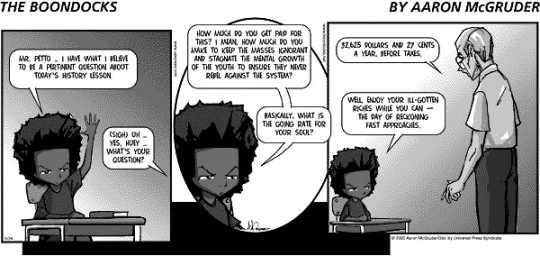
The idea that they were essentially “saving” kids from themselves and the communities around them drove some staff members to befriend kids rather than encourage their academic or personal development. One white teacher whose actions were particularly infuriating, let’s call him Mr. Frank, taught special education students who struggled behaviorally and academically. In this setting, it meant his class was full of the Black boys who could not sit still. Students dubbed it the place you go to “listen to music and eat snacks.” In meetings, Mr. Frank spoke openly and often about all the academic tasks he felt like students were incapable of even trying. These ideas help to explain some of the trash that passed for rigor in his classroom. He let students print Wikipedia pages and paste them to trifolds for final project work. He excused them from completing assignments and rarely failed kids regardless of what their effort or attendance looked like. Instead of encouraging academic growth in any meaningful way, he took kids to the store, bought them food, and handed out money. Let’s pause here, because many of these things sound incredibly sweet when done by a family member or friend. And yes, relationships are super important when teaching. But building them isn’t the ONLY part of teaching. As educators we focus on building relationships with kids in order to better TEACH them. To do this we have to actually believe in their intellectual capabilities enough to push for their academic growth. Mr. Frank didn’t see the second part of the equation as important though. He thought so little of the kids’ intelligence that there was no urgency in actually teaching them. He was there to be nice to them. To call them his “boys.” To make friends.
Mr. Frank’s existence as a 60-something year old white man didn’t stop him from greeting Black kids as the n-word and jokingly calling a young woman a “ratchet ass bitch” in front of a group of males in order to get a laugh from them. In previous years before I had arrived to the school, Mr. Frank had a co-teacher who was a gay trans man. When students in his class had been verbally assaulting, and in one instance physically taunting the co-teacher, Mr. Frank simply ignored the situation. He claimed his co-teacher needed to make better relationships with the kids, instead of using the teachable moment to encourage students to confront their blatant homophobia and transphobia. It would not have been easy. But actual, true teaching never is.
Over the course of my year there, it became clear that Mr. Frank’s class was a fun holding cell. Its sole purpose was to have somewhere to put kids. And with the low expectations and easy grades, it wasn’t difficult to see how the desire to be a savior to his idea of poor, broken, Black kids translated to the goal of befriending his students rather than teaching them.
the following is a snapshot of interviews with teachers and students about their experience.
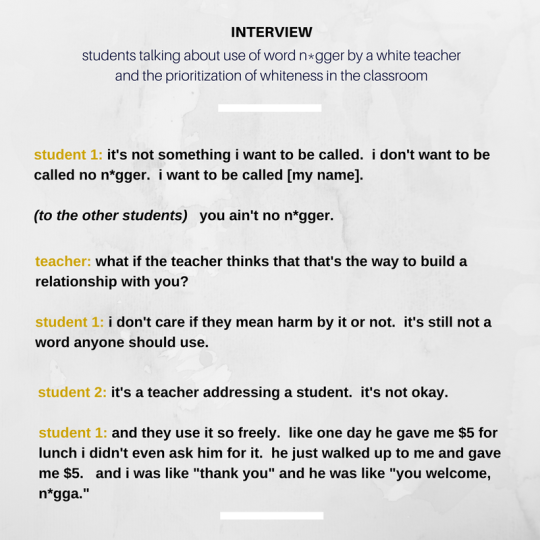
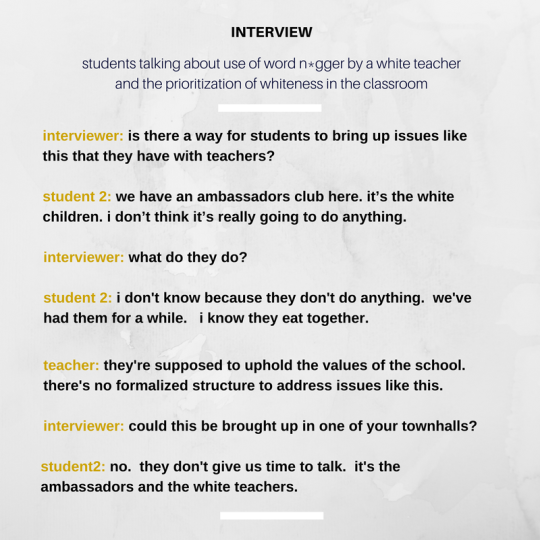
The privileging of white voice/ opinion
Outside of Mr. Frank’s outrageous everyday actions, another obvious indicator of racism in our workplace was the constant approval of white opinion and the subsequent shutting down of voices of color. One white teacher who was covering a Black educator’s classroom told students that their definition of racism, one that recognizes that all whites receive benefits and privileges from systems of white supremacy, was wrong because it made white people uncomfortable. He justified his assertion by coolly stating that he could speak to the issue because his partner was mixed race.
Over the course of the year, several teachers of color had complained about Mr. Frank’s behavior, specifically about their discomfort with him using the n-word and how his decision to do so made the workplace feel unsafe. They were told several times, “He has his methods.” Early in the year, a young Black woman was hired as his co-teacher but didn’t last in his classroom a month before needing to be placed with another educator. She expressed to me that he often seemed unprepared to teach and when she asked for lesson plans or outlines, she was scolded. He told her, “You don’t ask questions. I’ve been doing this for years. I’m the surgeon, you’re the assistant.” When she went to the principal with complaints of being treated condescendingly, she was reprimanded for causing trouble and made to sign a contract stating that she would never discuss Mr. Frank with other teachers while on the school premises.
Later in the year, when I tried to organize a meeting with a few teachers of color to talk about how best to deal with a white man calling Black kids the N-word, and brainstorm coping strategies for the growing list of racial microaggressions at work, I was called into the principal’s office for a meeting with her and the dean. Some folks suspected that someone had ratted me out and brought the principal the information. Others insisted that she regularly read staff emails. Either way, in the meeting I was made to apologize for my unprofessional behavior, despite the fact that I had previously addressed the principal with my concerns and was dismissed without any promise of further action.
All these instances taught an easy lesson. Other teachers of color and I quickly learned that if you had issues with how white teachers treated you, you kept your mouth shut. If you questioned how certain practices and behaviors were impacting students of color, you kept your mouth shut. And if you wanted to address issues of microgressions that made the workplace toxic, you didn’t discuss it at work in hopes of bringing about change. You went to happy hour with people you trusted and cried.
Valuing Intention over Impact
One of the major things that became apparent to me during my time at this school was how heavily white people who made the workspace uncomfortable leaned on their good intentions. Because everyone meant well, because everyone could couch their behaviors in the altruistic deed of educating Black kids with huge academic gaps, they did not seem to mind if their actions had negative impacts on coworkers of color or even the Black children they were supposed to be serving. When I realized this about my boss and coworkers, I began to see how strongly whiteness seeks to protect itself in schools. Everything from Mr. Frank’s “methods,” to teachers doing work for students they didn’t deem capable, to oft-expressed colorblind sentiments that white teachers used to make connections between themselves and the kids, were excused and never questioned because the people who did or said them “meant well.” It didn’t matter what impact this had on the kids and it sure as hell didn’t matter how it made staff members of color in the school feel.
It was around this time that I began to draw connections between law enforcement and education systems in this country. I knew from the many instances of cops who got off for murdering unarmed Black men and women, that whiteness in their institution also tended to protect itself. And much like with law enforcement, the issues that exist in education aren’t addressed as system-wide problems indicative of attitudes and biases towards people of color. Instead we discuss the few bad apples. In the education field, this means the teachers who DON’T care at all. They are essentially, the teachers with ill intent.
The problem with this approach is that most all white folks, teachers and otherwise, never see themselves as bad apples. They know that they mean well so they assume that they couldn’t possibly be a part of the problem. At this alternative school, the white folks who caused a great deal of the microaggressions could barely hear us decrying their actions and language. I imagine because our complaints were drowned out by the sound of them patting themselves on their backs every day for their hard work.
Recently, I read a headline that announced that percentages of Black teachers in the classroom have fallen drastically in the past few years. I didn’t bother reading the article because I felt like the wounds from last year were a little too raw for me to willingly subject myself to stories about why others like me may have been driven off. Halfway through the year when I was processing the notion of the education system being corrupt and failing to serve Black and Brown students, I posted a rant on Facebook. In it, I reflected on nearly 9 years in the education field and the experiences it took to get there. I specifically recalled going to grad school with people who made sweeping generalizations about Black/ Brown communities and consequently stereotyped their students as well. I remember smoking cigarettes after classes with fellow students of color lamenting the fact that some of the people in our Ivy League program were already in positions of power in schools full of Black children. I remember how proud they seemed of themselves for taking on the work of “fixing“ kids and schools, despite the lack of desire to fix their own racist viewpoints, language, approaches, etc.
Like last year, I brushed it all off over happy hours. I was still hopeful then. I thought that I could teach Black and Brown youth in a way that centered them, their stories, their beauty, and their lives. I did not consider that those grad school classmates who thought so little of us, and that people who shared their ideas, were already running the system and starting the charter schools. I did not consider that fighting for my kids essentially meant fighting against these people. It was a battle I was unprepared for when I first started teaching in 2007. It is a battle I expect to fight for the rest of my life. Though the new hope is to one day do it within an institution that is willing to take on the fight with me. This would save me from a career of holding my tongue until I get to half-priced drinks with other teachers of color who have learned that silence is the only way to stay in the ring.
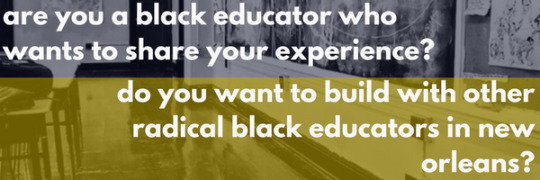
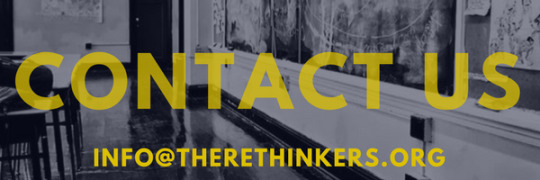
7 notes
·
View notes
Text
diversity does not equal equity
As the charterized education landscape in New Orleans faces PUSH BACK FROM EDUCATORS AND YOUNG PEOPLE who have been on the receiving end of an inequitable education, diversity is gaining popularity as a new buzzword, a panacea that somehow solves systemic racism without ever addressing it.
A recent article on Nola.com (“SCHOOL SEGREGATION PERSISTS IN THE NEW NEW ORLEANS”) raises some interesting points about the state of education in New Orleans but offers an incomplete analysis. Instead of focusing on the problems of market based education reforms that have resulted in charterization of all but 5 schools - over testing, extreme social control and discipline - Danielle Dreilinger’s article instead centers on the prevailing mythology that the lack of multi-cultural “integrated” classrooms is what is stymying academic success for the youth of color that attend our city’s “public” charter schools. In doing so it misses the mark and fails to address the inequities of market based charter schools.
Calls for “diversity” ignore the history of southern education of the 20th century when mostly Black youth were legally forced into separate and unequal schools. Those public and private all-Black schools were almost universally underfunded, overcrowded and populated by students and teachers fighting to have access a quality education. Under those conditions the U.S. south produced four generations of academic excellence from Ida B. Wells to Martin Delany, from Charles Drew to Oretha Castle Haley to Pauli Murray, the list goes on. These segregated schools also prepared thousands of regular people—like many parents and grandparents who attended segregated Louisiana schools from elementary through the Southern University system—to achieve advanced educational degrees, robust careers and a measure of financial stability.
These educators knew that racial integration and assimilation were not the key to academic excellence. The true keys were an experienced teaching staff, an understanding of education as both a practice of freedom and an act of love, a commitment to the whole child, and an ability to make learning culturally relevant. With this knowledge it becomes clearer that over testing, inexperienced teaching staff and the inability to address the whole child are what really ail New Orleans schools.
The current conversation about “integrating” New Orleans’ schools presupposes that the absence of white students hinders the academic achievement of students of color. This assumption is based in white supremacy. Not the white supremacy of the Klansmen, but of ordinary people who still hold a fundamental belief that white people, by their very presence, bring improvement.
Let’s be clear: while diversity is a much easier and more comfortable goal, it is in no way equal in breadth or depth to the necessary goal of equity. We know that the injustice and inequity in our city’s schools echo the injustice and inequity in our neighborhoods and the injustice and inequity in our everyday lived existence.
The moves by some charter schools, as cited in the article, to recruit and enroll a “more diverse” student body creates increased competition among Black, Latinx and Vietnamese students for spots at these schools that amounts to a kind of reserve affirmative action.
Instead of giving enrollment opportunities to oppressed groups, these schools focus resources and energy on the recruitment of white students - who are both a minority in the New Orleans population and who, by virtue of the racial wealth divide, have greater access to educational opportunities.
Armed with this the knowledge we should not be focusing our energies on diversifying charter schools, but on RE-INVENTING WHOLE SCHOOL SYSTEMS with equity at the center.
2 notes
·
View notes